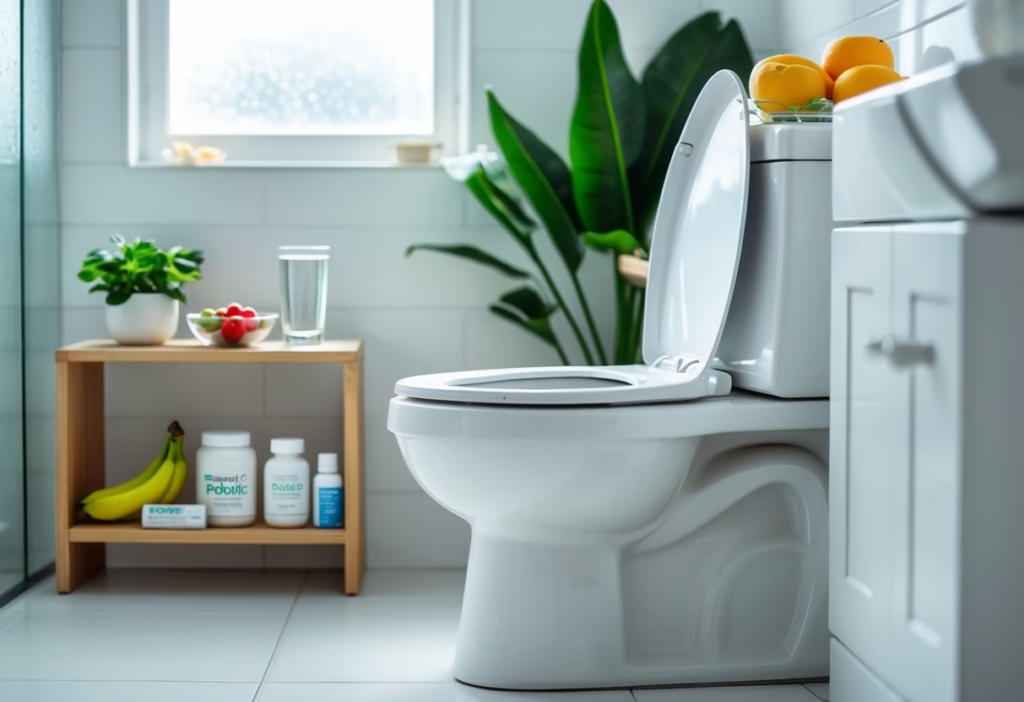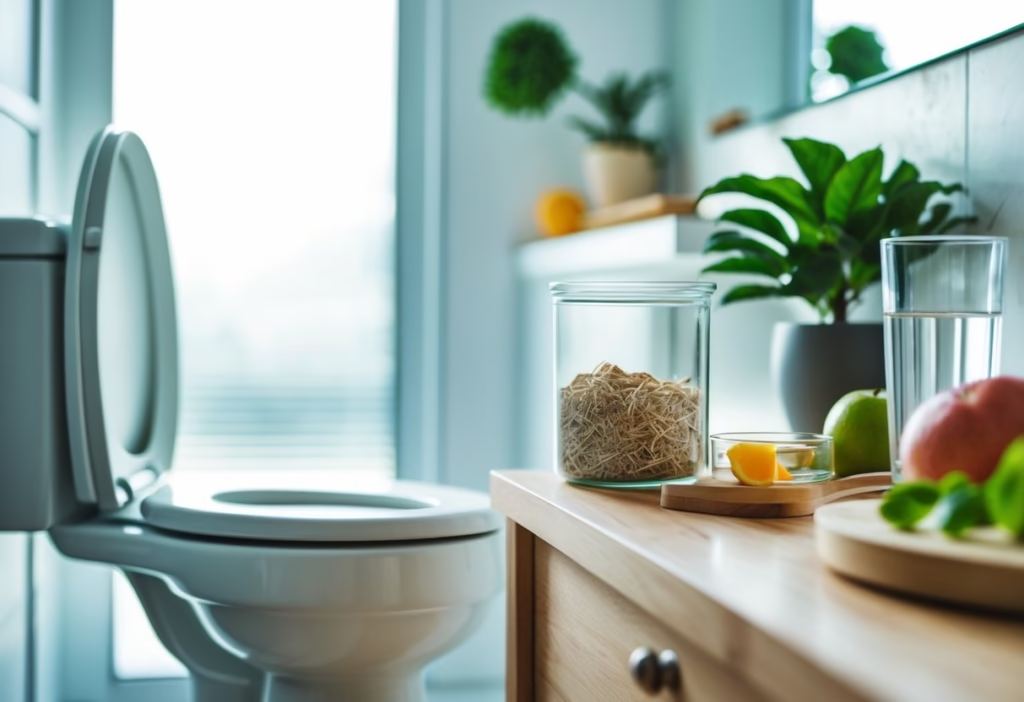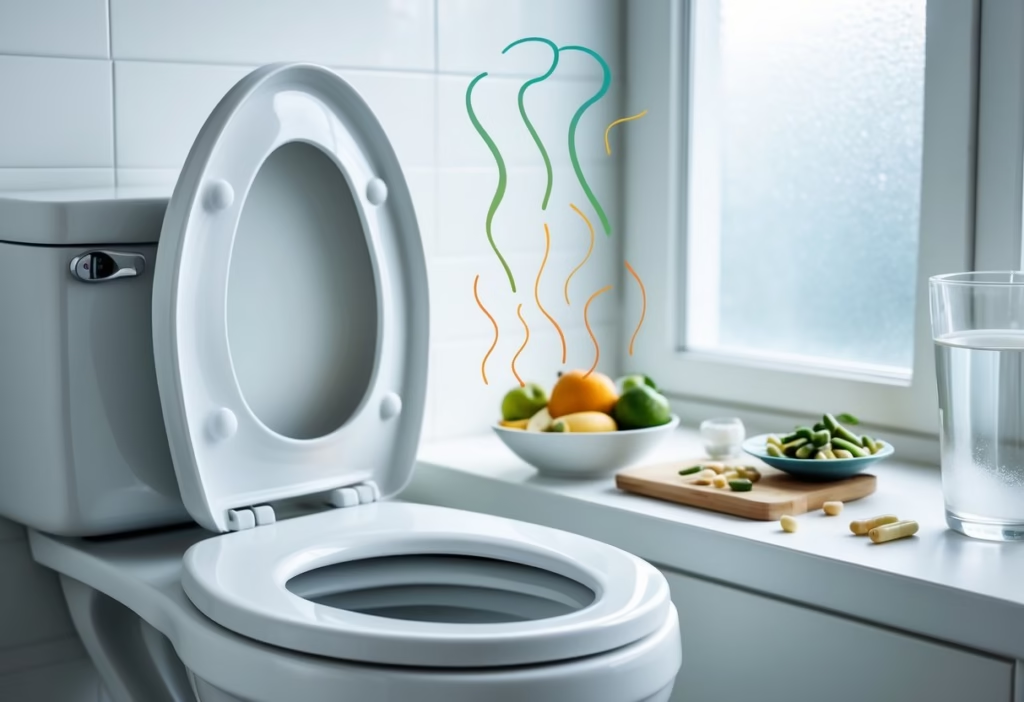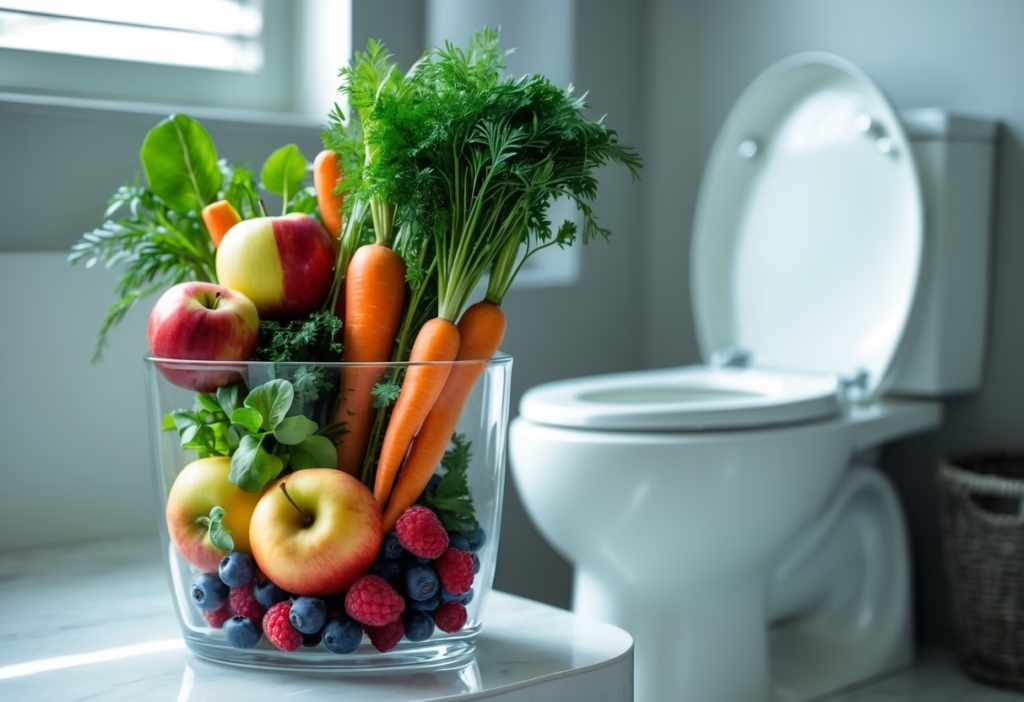Most people just flush and move on, but what your poop’s color and smell reveal about your health can actually offer some real clues about your digestive wellness.
The smell of stool comes mostly from bacteria in your gut breaking down food. If the odor changes, it usually means something’s shifted with your gut health, your diet, or maybe there’s an underlying digestive issue.

All stool has some odor—thank your gut bacteria for that. But if your bowel movements suddenly turn unusually strong, sweet, or just flat-out foul-smelling, it could point to health issues.
The shape, color, and smell of your poop can tell you a lot, from simple diet tweaks to more serious digestive problems that might need a doctor’s attention.
If you get how stool smell connects to gut health, you can spot when your digestive system’s cruising along or when it might need a little help.
Different odors often trace back to specific causes—sometimes it’s what you ate, sometimes it’s lifestyle, and sometimes it’s a medical thing that changes how your body processes nutrients.
What Stool Smell Reveals About Your Gut

Stool smell gives you a peek into what’s happening inside your digestive system. The odor forms from a mix of bacteria, diet, and how your organs are working.
When something shifts in your gut, the smell often changes too.
How Stool Odor Forms
Stool odor starts with what you eat. Food travels through your stomach and small intestine, then lands in your large intestine.
That’s where billions of bacteria get to work breaking down whatever’s left. As they do their thing, they create chemical compounds—some of which smell pretty strong.
Your gut microbiome plays a big role here. A healthy, balanced gut microbiome keeps odors in check. When good and bad bacteria are balanced, things usually smell, well, normal.
Your liver steps in too. It breaks down smelly stuff that comes from bacterial digestion, and your kidneys help flush those out. When these organs are doing their job, most bad odors stay under control.
Key factors that create stool odor:
- Bacterial breakdown of food
- Types of bacteria in your gut
- Liver function
- Kidney function
- Diet and food choices
Normal vs. Unusual Stool Smells
Normal stool has a mild, earthy smell—nothing too wild. Everyone’s “normal” is a bit different, depending on diet and gut bacteria.
Unusual stool smells, though, can be a red flag. Different types of odors may point to specific health issues.
Ammonia smell often means liver problems or bacterial imbalances. Your large intestine makes ammonia when it digests protein, and if the liver can’t handle it, the smell ramps up.
Metallic smell usually means there’s blood in your stool. Iron from red blood cells creates that metallic tang—sometimes a sign of inflammatory bowel disease or hemorrhoids.
Sulfur or rotten egg smell comes from, you guessed it, sulfur compounds. Often it’s from your diet—eggs, meat, broccoli, that kind of thing. Sometimes it means infection, though.
Chemical, burnt, or just extremely foul odors can also show up, and they’re usually worth paying attention to.
When Changes in Stool Smell Matter
If your stool suddenly smells way different than usual, don’t just shrug it off. A particularly foul odor might mean your gut bacteria are out of balance or you have an infection.
See a doctor if you notice:
- Sudden changes in smell that stick around for more than a few days
- Really strong ammonia odors
- Metallic smells along with blood in your stool
- Chemical or burnt smells
- Fever or stomach pain with those smell changes
Sometimes, food is to blame—sulfur-rich meals or new meds can mess with odor for a day or two.
If the smell sticks around, though, it could be a sign of digestive problems. Things like bacterial infections, inflammatory bowel disease, or liver issues can all change how your poop smells.
People with conditions like Crohn’s disease often notice smell changes before anything else flares up. It helps to know your baseline so you can catch when something’s really off.
What really matters is how different the smell is from your own usual, not compared to someone else.
Common Types of Stool Smells and Their Causes

Different stool odors can actually point to specific digestive issues—sometimes it’s your diet, sometimes a bacterial infection. Each type of smell gives a clue about what’s happening in your gut and if you might need to call your doctor.
Foul or Strong Odor
Foul-smelling stool usually means something’s off with digestion or your gut bacteria. It’s stronger and just more unpleasant than the usual.
Malabsorption is a big culprit. When your body can’t absorb nutrients properly, undigested food makes things smell worse as it moves through your system.
Conditions that can cause malabsorption include:
- Celiac disease
- Crohn’s disease
- Pancreatic disorders
- Small intestinal bacterial overgrowth
Bacterial infections like Clostridium difficile can create a really nasty odor. These infections mess with your normal gut bacteria and release toxins that change stool smell.
Antibiotics sometimes make your poop smell strong for a bit—they kill off good bacteria, but the smell usually settles down once your gut recovers.
Ammonia-Like and Metallic Smells
Stool that smells like ammonia or metal? That’s less common, but it can mean something more serious is going on.
Liver problems can cause ammonia-like stool odors. If your liver can’t process toxins, those compounds build up and change the smell.
Kidney issues can also give stool an ammonia scent. When kidneys can’t filter waste properly, toxins pile up.
Metallic-smelling stool might mean:
- There’s blood in your digestive tract
- You’re taking iron supplements or certain meds
- You have a metabolic disorder
These odors don’t show up often. If you notice ammonia or metallic smells that won’t go away, it’s probably time to check in with your healthcare provider.
Sulfur and Rotten Egg Smells
Sulfur-heavy foods make your stool smell like rotten eggs. Bacteria in your colon break down sulfur compounds from certain foods, and that’s where the stink comes from.
Common sulfur-containing foods:
- Meat, poultry, seafood
- Eggs and dairy
- Veggies like broccoli, asparagus, leeks
- Legumes—soybeans, black beans, and the like
Usually, the smell fades out once those foods move through your system. But if the sulfur smell sticks around, it could mean something else is up.
Parasitic infections like giardiasis can keep that sulfur odor going. These mess with how your intestines process food and create gas.
Some folks have a harder time digesting sulfur compounds—genetics can play a part—so even normal amounts of these foods can make stool smell stronger.
Bacterial overgrowth in the small intestine also pumps out sulfur gases, so you might notice that rotten egg smell more often.
Sweet, Fruity, and Unusual Odors
Sweet or fruity stool odors? That’s rare, and it often signals a metabolic problem. Your body can’t process certain compounds right, so the smell changes.
Diabetes can sometimes make stool smell sweet, especially if blood sugar isn’t controlled. High glucose changes how your body handles nutrients.
Certain infections can also create weird sweet odors. Some bacteria just make different-smelling compounds.
There are rare genetic metabolic disorders that cause fruity or sweet smells in stool. These change how your body breaks down nutrients or chemicals.
Medications and supplements sometimes cause odd stool odors, too—sweet or even chemical-like. Usually, the smell goes back to normal when you stop the meds.
If sweet, fruity, or just plain strange stool odors stick around, get checked out. These aren’t common and can point to health conditions that need treatment.
Digestive Conditions Linked to Changes in Stool Smell

Lots of digestive conditions can mess with stool odor by changing how your body processes food and absorbs nutrients.
Infections, inflammatory disorders, and absorption problems each create their own smell patterns, which can help you and your doctor figure out what’s going on.
Infections and Gastrointestinal Disorders
Bacterial and parasitic infections often make stools smell much stronger, along with other digestive symptoms. Gastrointestinal infections can create especially nasty odors because harmful bacteria release toxic stuff during digestion.
Common infection-related symptoms include:
- Sudden onset of foul-smelling diarrhea
- Abdominal pain and cramping
- Fever and nausea
- Watery or loose stools
Clostridioides difficile (C. diff) infections stand out for their strong odors. This bug often shows up after antibiotics mess with your normal gut bacteria.
Parasitic infections like giardiasis change how stool smells too. These parasites mess with digestion and make things smell kind of sulfurous.
Food poisoning from contaminated food brings similar symptoms. The bacteria responsible create gases that make everything smell worse than usual.
Inflammatory Bowel Disease and IBS
Inflammatory bowel disease messes with stool smell by causing chronic inflammation in the gut. Crohn’s disease and ulcerative colitis both lead to some pretty odd odors.
IBD-related smell changes happen because of:
- Chronic inflammation interfering with digestion
- Shifts in gut bacteria
- Poor absorption of nutrients
- Blood in the stool
Folks with Crohn’s disease might notice a metallic smell when there’s bleeding. The iron in blood is usually the culprit for that weird scent.
Ulcerative colitis can cause ammonia-like odors. Inflammation disrupts how the intestines process proteins, and things just get off track.
Irritable bowel syndrome (IBS) can change stool odor too, though usually not as dramatically as IBD. IBS affects how quickly food moves through your intestines.
IBS symptoms that impact smell include:
- Switching between diarrhea and constipation
- Bloating and gas
- Abdominal pain
Malabsorption and Food Intolerances
Malabsorption disorders make it hard to absorb nutrients, which leads to some pretty distinct stool odors. Poor absorption lets foul-smelling stuff pass through undigested.
Celiac disease damages the intestines, so gluten can’t get digested. This causes greasy, foul-smelling stools, sometimes with weight loss and stomach pain.
Lactose intolerance symptoms include:
- Gas and bloating after dairy
- Diarrhea that smells sour
- Stomach cramps
- Nausea
Pancreatic disorders mess with fat digestion, so stools turn oily and smell really strong. The pancreas just doesn’t make enough enzymes to break down fats.
Key malabsorption warning signs:
- Greasy or oily stools
- Unexplained weight loss
- Vitamin deficiencies
- Chronic diarrhea
Food intolerances bring their own scent changes. Lactose intolerance tends to create sour odors, while fructose intolerance can cause gas, bloating, and sometimes sweet-smelling stools.
How Lifestyle and Diet Impact Stool Smell
What you eat and how you live really shape how your stool smells. Sulfur-rich foods like meat and cheese crank up the odor. Meanwhile, staying hydrated and eating enough fiber help keep things regular and cut down on the bacteria that make things stink.
Diet and Common Foods Affecting Odor
Certain foods just make things smell more intense. Sulfur-rich foods—think meat, cheese, and cruciferous veggies—aren’t easy to digest. Your gut has to work harder, and you end up with more gas and stronger smells.
High-Odor Foods:
- Red meat and processed meats
- Dairy, especially cheese
- Brussels sprouts, broccoli, cauliflower
- Eggs and garlic
- Onions and cabbage
Processed and sugary foods can also mess with digestion. They take longer to break down and ferment in your gut, and all that extra fat from junk food? It just makes things smellier and looser.
Alcohol doesn’t help either. It’s full of sulfates, which gut bacteria turn into stinky gases. Plus, drinking too much speeds up digestion, so waste gets pushed through before it’s ready.
Foods That Reduce Odor:
- High-fiber fruits and veggies
- Whole grains
- Lean proteins like fish and chicken
- Probiotic-rich foods (yogurt, for example)
Hydration, Fiber, and Bowel Habits
If you’re not drinking enough water, your digestive system struggles. Dehydration makes stool harder and slows everything down. When stool hangs out in your colon too long, it ferments and gets smellier.
Water keeps things moving and lets fiber do its job. That means healthier digestion and more regular bowel habits.
Fiber’s Impact on Smell:
- Soluble fiber feeds good gut bacteria
- Insoluble fiber helps waste move along
- Not enough fiber? Expect constipation and bloating
- High-fiber foods from whole grains, fruits, and veggies usually mean less odor
Regular bowel habits keep waste from sitting too long. If you’re irregular, bacteria have more time to break down waste, and that usually means stronger odors.
Gut Microbiome Imbalances
Your gut is home to trillions of bacteria, and they really do influence stool smell. Healthy gut bacteria break down food the right way and keep digestion balanced. When the bad guys outnumber the good, things start to smell off.
Signs of Microbiome Imbalance:
- Unusually strong or foul-smelling stools
- Frequent bloating and gas
- Irregular bowel movements
- Digestive discomfort after meals
Antibiotics can throw your gut bacteria out of whack. That usually means foul-smelling stool until things balance out again.
Probiotics help restore healthy gut bacteria. These friendly microorganisms support digestion and can cut down on stool odor after a while. Fermented foods like kefir, sauerkraut, and kimchi are loaded with probiotics.
Stress and lousy sleep can mess with your gut bacteria too. Chronic stress actually changes the mix of bacteria in your intestines, which sometimes leads to stronger odors and more digestive issues.
Stool Changes as Warning Signs: When to See a Healthcare Professional
If your stool suddenly starts smelling way worse and it sticks around for days, or you notice other weird symptoms, it’s time to talk to a healthcare professional. They can run tests to figure out what’s going on underneath it all.
Persistent or Sudden Changes in Odor
If your stool suddenly starts to smell extremely foul and doesn’t improve after three days, get it checked out. That kind of change can mean something serious is brewing in your gut.
Red flag odors include:
- Sweet or fruity smells (could mean diabetes issues)
- Metallic odors (might suggest bleeding)
- Really offensive smells that don’t go away, even after you change your diet
Changes in your bathroom habits can give clues about bigger digestive problems. When odor shifts come with changes in color or consistency, pay attention.
Doctors look at how long and how bad the odor is when you complain about it. If your stool smells completely different than usual, don’t ignore it.
Associated Symptoms to Watch For
Stool odor changes paired with other symptoms are a bigger deal. Together, they often point to specific medical conditions that need treatment.
Critical symptoms include:
- Black, tarry stools with a foul smell (possible upper digestive bleeding)
- Pale or clay-colored stool with odd odor (could be liver or gallbladder trouble)
- Blood in stool plus a change in odor (hemorrhoids, diverticulitis, or maybe colorectal cancer)
- Ongoing diarrhea with a bad smell (inflammation or infection)
If you notice abdominal pain, unexplained weight loss, or fever along with odor changes, don’t wait. These can mean something serious like inflammatory bowel disease.
Warning signs that mean you need medical help include sticky stools with a strong odor. That combo can point to bile duct blockages or even internal bleeding.
Diagnostic Tools and Testing
Healthcare professionals use a range of methods when they’re trying to figure out what’s going on with stool changes. These tests can point to the real cause behind odd odors or weird consistency.
Common diagnostic approaches:
- Stool sample analysis – Checks for bacteria, parasites, and blood
- Blood tests – Detect inflammation markers and organ function
- Colonoscopy – Examines colon for hemorrhoids, diverticulitis, or cancer
- CT scans – Visualize digestive organs for structural problems
A stool sample usually gives the clearest info about digestive health. Labs can spot specific bacteria or find hidden blood that might explain changes in odor.
Doctors sometimes order extra tests if the first results raise more questions. For example, they might check liver function when stools look unusually pale, or screen for diabetes if there’s a sweet smell.
